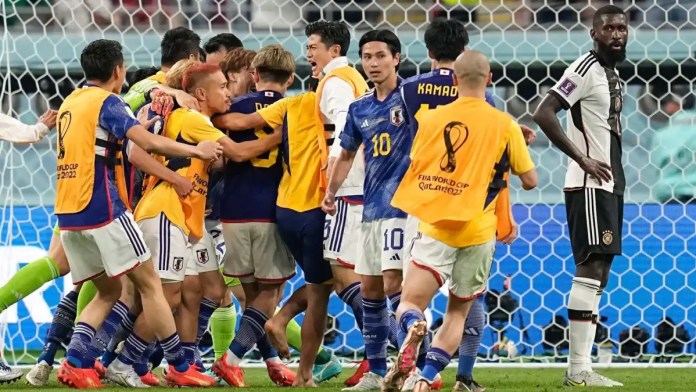Japan trailed and then overtook Germany in the former’s dramatic 2-1 Group E opener at the Fifa World Cup 2022, earning their first win over their European opposition. Hansi Flick’s side took the lead in the first half through an Ilke Gundogan penalty. Still, after some timely second-half substitutions, Japan opened their 2022 World Cup campaign with goals from Ritsu Doan and Takuma Asano.
It is now the second consecutive football World Cup in which Germany have lost their first group game since a 1-0 loss to Mexico in 2018, a tournament that saw them knocked out at the group stage while trying to defend the trophy. With Spain waiting in just four days, the Germans now face a very real challenge to reach the knockout rounds. But where did it go wrong for them against Japan?
Germany have a slot difficult to fill
A decade after Philipp Lahm until his international retirement in 2014, it can be difficult for German fans to accept their situation at right-back, with only temporary options available, including the clunky Niklas Sule, the square of pegs round the holes.
Sull’s selection caused Germany more problems than it solved against Japan, not least because he played Asano onside for the winning goal with some awful positioning. Although a very consistent centre-back, Sule offers little as a modern full-back, even if it allows David Raum to move further up the opposite flank.
Flick’s decision to cast Nico Schlotterback as the character also didn’t pay off, as he looked extremely shaky throughout. The obvious answer is to move Sule to the centre of defence and Joshua Kimmich to right-back, with his Bayern Munich midfield partner Leon Goretzka coming into the starting lineup. Both Kimmich and Flick, however, seem reluctant to turn in this direction - even as it is clear that it would greatly benefit the team.
Germany lacks killer instinct
Kai Havertz has been far from a prolific goalscorer since his move to Chelsea from Bayer Leverkusen and once again struggled as a lone centre forward against Japan. Although he excelled as a false number one for Leverkusen, he has failed to recapture that form since moving to England and does not appear to be physically strong enough to lead the line for his country.
Gone are the days of Mario Gomez and Miroslav Klose, the focal point and constant threat in the penalty box. Havertz, by contrast, simply doesn’t deliver and often occupies the same space as other midfielders, leaving no one on the end of crosses or through balls. Niklas Fullkrug, having a good season at Werder Bremen but is inexperienced at the international level, the answer remains to be seen.
Outside of Havertz, Germany weren’t clinical enough when they were presented with chances, and it’s unclear whether that stemmed from complacency or a lack of confidence. Serge Gnabry and Gundogan were both too quick to take shots when teammates were better placed, making unreasonably poor decisions that probably resulted from them feeling the goalscoring burden.
Hansi Flick’s substitutions
Simply put, Hansi Flick lost the fight in the dugout. Japan’s Hajime Moriyasu responded bravely at half-time with his side trailing 1-0, switching from a back four to a back three and pushing his wing-backs up the pitch. They were then eventually replaced by true wingers, who provided a greater attacking threat.
In contrast, Flick ended up replacing three of his most dangerous players — Jamal Musiala, Gyari and Gundogan — and in doing so completely nullified Germany. The game was wide open in the second half but Flick’s hesitation only allowed Japan to seize the gaps and the initiative.
Absence of Leroy Sane
It was a game made for Leroy Sane, a player who could take full advantage of the space Japan was leaving as the game stretched. Sane could have been a surefire starter for Germany if fit and his absence, at last, was evident.
Musiala, Ginabri, Müller and Sane combine to have a devastating effect on Bayern Munich and form the most potent front four in Germany. Although, as mentioned, there are no true poachers among them, as a collective they have proven themselves capable of rotating across the forward positions to devastating effect, such is their understanding at the club level.
Sane’s pace and directness were sorely missed, with only Raum providing any real width. Not to mention he has 10 goals in 19 appearances for Bayern this season.
Who’s scared?
Since their unstoppable run to their fourth World Cup in 2014, Germany have failed to inspire the same fear and respect among opponents. This was particularly evident after the 2018 World Cup, which included defeats to Mexico and South Korea and a disappointing performance at Euro 2020. Last year in the World Cup qualifiers they were Noth lost to Macedonia, they lost at home to Hungary in the Nations League.
It’s not the same ruthlessly efficient, big team for big event Germany that we’re used to seeing. Teams know their backline is weak and vulnerable. In fact, Germany seemed to know it too, and as soon as Japan equalised, you thought they would win the game, such was the reaction (or lack thereof) of the German players.
Mindset is a difficult thing to recover. This is not always possible. Flick must find a way to do this and recapture the same arrogance, determination and nerve that made them world champions. Germany often seemed to win the psychological battle before even setting foot on the field. Now, the opposite seems to be true.



You must log in to post a comment.